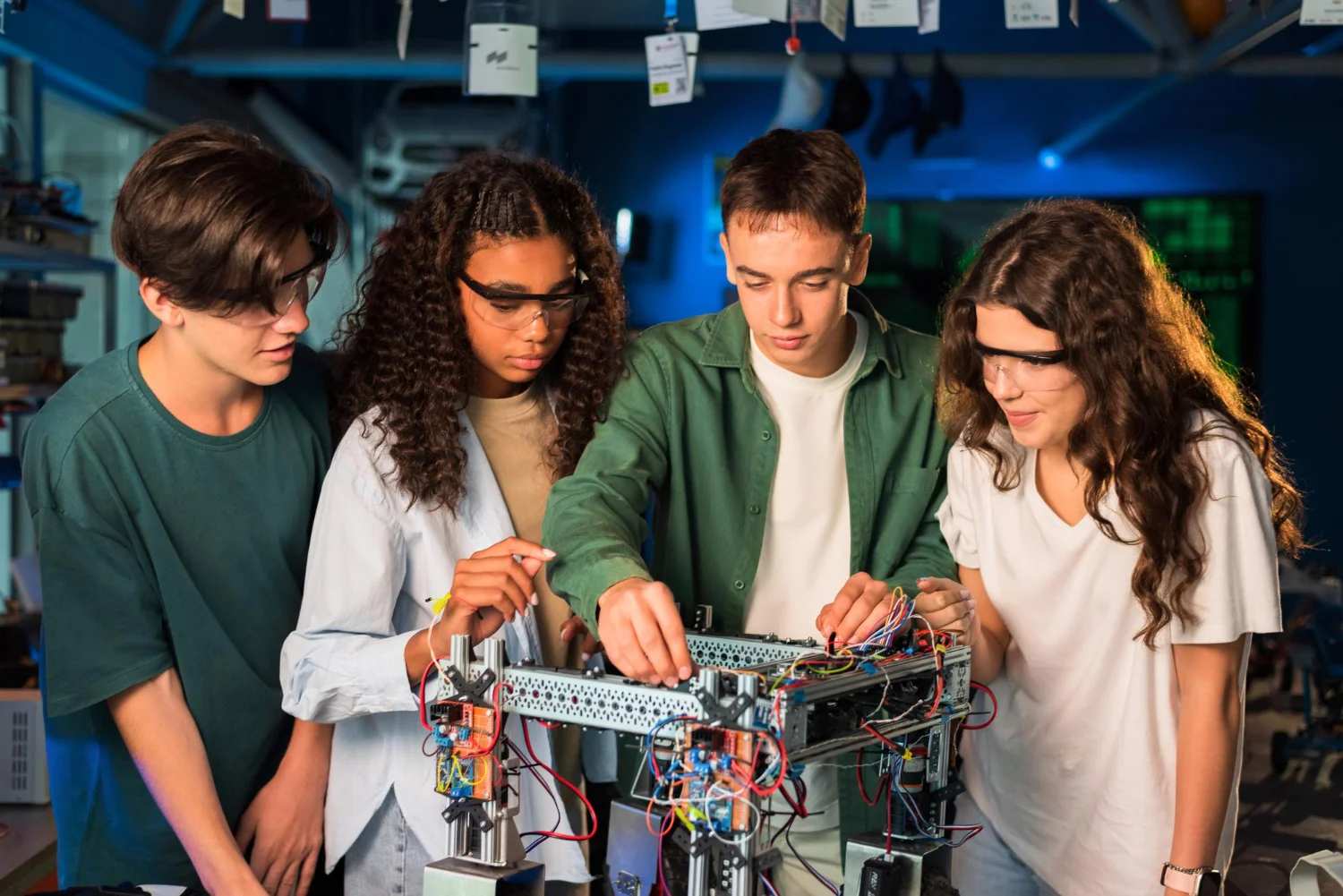At its core, a hackathon is a marathon where students work in teams to solve problems using technology. Typically held over a day or two, these gatherings encourage participants to design, develop, and present a prototype, often from scratch, within a limited timeframe.
Contrary to popular belief, hackathons aren’t reserved for expert coders. Many are tailored to beginners and welcome a wide range of interests. Teams are usually made up of students who bring different strengths to the table—whether in coding, design, research, or communication.
What sets hackathons apart is their immersive nature. Participants not only build something tangible, but also learn to collaborate under pressure, think creatively, and adapt quickly. Many events offer guidance from mentors, access to hands-on workshops, and insights from industry professionals, making the experience both educational and inspiring.
For high school students who want to pursue a tech major eventually, hackathons are more than just extracurricular activities. They’re powerful learning experiences that demonstrate initiative, problem-solving ability, and real-world application of skills to universities. Let’s explore some of the most prestigious hackathons for high school students:
1) PenApps
Location: University of Pennsylvania, US
Age group: Students aged 15 and above
Competition dates: Typically held in September
Application deadline: Mid-July (exact dates vary by year)
Competition content: Software Development, Hardware Integration, Artificial Intelligence, Cybersecurity
Cost: Free (includes meals, snacks, and travel reimbursements)
Established in 2009, PennApps is recognised as the first student-run college hackathon in the US, setting a precedent for similar events across the country. Hosted at the University of Pennsylvania, this prestigious 36-hour hackathon attracts over a thousand high school and college students from around the world, fostering an environment of innovation and collaboration. Participants form teams of two to four members to develop projects spanning various platforms, including web and mobile applications, hardware solutions, and more. The event emphasises learning and community, offering workshops, mentorship, and networking opportunities with industry professionals. Notably, PennApps provides travel reimbursements and covers meals, making it more accessible for participants. With a history of awarding substantial prizes and a commitment to inclusivity through programs like the Diversity Fellows, PennApps stands as a significant opportunity for students to enhance their skills and gain recognition in the tech community.
2) NASA International Space Apps Challenge
Location: Global (in-person and virtual events)
Age group: Those under 18 must register with and be accompanied by a legal guardian
Competition dates: Typically in October (Varies by year)
Application deadline: Varies by location. Registrations open in July
Competition content: Earth and space science, software development, data visualisation, storytelling, design, hardware, open science
Cost: Free
The NASA International Space Apps Challenge is the world’s largest global hackathon, engaging thousands of participants from over 185 countries. Over an intense 48-hour period, participants address real-world challenges using NASA’s open data. Recent prompts have included building tools to track climate change, designing systems for lunar living, and developing creative ways to visualise deep space signals.
Projects are evaluated based on creativity, relevance, data use, and potential for real-world impact. Winners from local events are considered for global recognition, and top teams are invited to present their work to NASA experts.
More than just a tech challenge, Space Apps is a platform for collaboration and learning, connecting students, professionals, and space enthusiasts with mentors, scientists, and engineers from NASA and its global partners.
3) Global AI Hackathon 2025
Location: Global (virtual) + in-person finalist event in Cambridge, Massachusetts, US
Age group: All ages. Those under 18 require parental consent.
Competition dates: Registrations in March. Submissions in April. Open till June. Finalist event in July (Varies by year)
Application deadline: Varies by year
Competition content: AI-powered mobile apps aligned with the United Nations Sustainable Development Goals (SDGs)
Cost: Free
Affiliated with the Massachusetts Institute of Technology (MIT), the Global AI Hackathon 2025 is organised by MIT RAISE and the App Inventor Foundation. It invites students, educators, and developers of all ages to design mobile apps that use artificial intelligence to address global challenges. Participants are encouraged to create solutions aligned with the UN Sustainable Development Goals, such as climate action, education equity, and good health and well-being.
Apps must be built using MIT App Inventor with integrated AI components, and can be submitted individually or as a team. This global event is not just about coding. It’s about using technology for social good. Participants can access AI extensions, attend community webinars, and receive feedback from mentors, educators, and technologists throughout the development process. The goal is to spark solutions that address real-world issues in areas such as environmental sustainability, healthcare access, and inclusive education.
A highlight of the program is the opportunity for selected finalists to travel to Cambridge, Massachusetts, and showcase their work at the MIT AI & Education Summit. Beyond recognition, this experience offers global networking, interaction with AI experts, and a platform to share ideas with changemakers from around the world.
4) HPE CodeWars
Location: Online. In-person at Roseville, California; Ft. Collins, Colorado, New Jersey; Taipei, Taiwan; Barcelona, Spain; Bengaluru, India.
Age group: 13 to 18 years
Competition dates: March 7 (Varies by year)
Application deadline: Varies by year
Competition content: Solving coding problems using C, C++, Java, or Python
Cost: free
HPE CodeWars challenges students to solve 26 algorithmic problems within a three-hour window. The problems vary in difficulty, with higher points awarded for more complex challenges. Participants can submit multiple solutions, with the best valid submission considered for scoring.
The competition features a real-time leaderboard, allowing participants to track their progress and standings throughout the event. For preparation, students gain access to a Practice Arena with over 100 coding problems and can review previous year’s problem statements.
Winners receive a cash prize and certificates. The event aimed to inspire students to enhance their coding skills and explore potential careers in technology.
5) TechXcelerate
Location: BITS Pilani, Hyderabad, India
Age group:15+ years
Competition dates: March (Varies by year)
Application deadline: February (Varies by year)
Competition content: Workshops in AI/ML, Web Development (MERN Stack), DevOps, and Data Science
Cost: ₹1,200–₹4,500 (depending on selected package)
TechXcelerate is a two-day national-level event in India combining hands-on workshops, a high-stakes hackathon, and an exclusive internship drive. Participants can engage in expert-led sessions on cutting-edge technologies, compete in a 20-hour hackathon with a ₹5,00,000 prize pool, and interview with over 100 top tech companies offering internships with stipends up to ₹1,20,000 per month. The event is structured to provide a comprehensive experience:
- Workshops: Interactive sessions on AI/ML, MERN Stack, DevOps, and Data Science.
- Hackathon: Teams of 2–8 members tackle real-world problems, with mentorship and multiple evaluation rounds.
- Internship Drive (Post-event): Participants can secure up to four paid role interviews and two unpaid internship interviews, based on their performance.
Hackathons aren’t just about tech. They’re about mindset—the kind that turns curiosity into action, and ideas into real-world impact. For high school students, they offer more than a line on their undergraduate application form. They allow them to demonstrate initiative, creativity, and grit. No one expects students to have the answers at the beginning. What matters is the willingness to try, to build, and to learn. If you’re wondering how to strengthen your undergraduate profile, get in touch. Meanwhile, read our blogs on How to Enhance Your College Application by Showcasing Intellectual Curiosity and 16 Most Competitive US Summer Programmes for International Students: A Comprehensive Guide.




